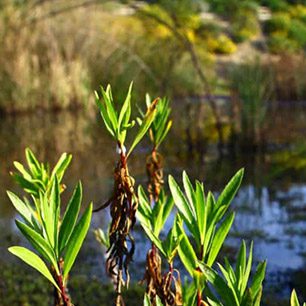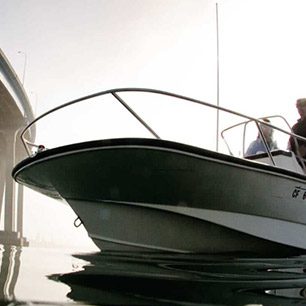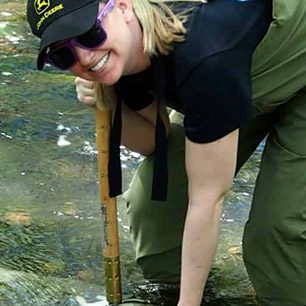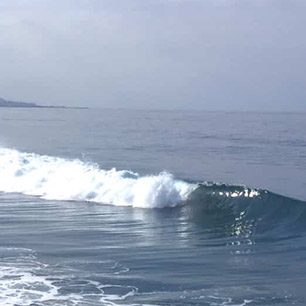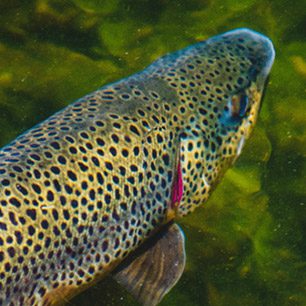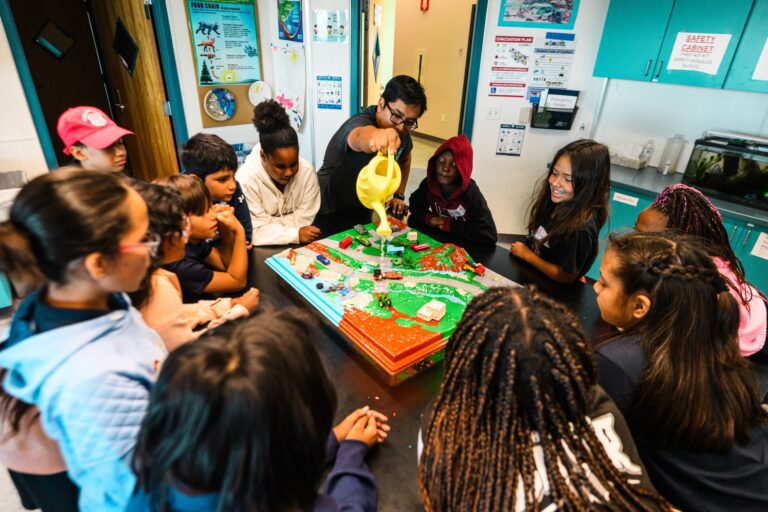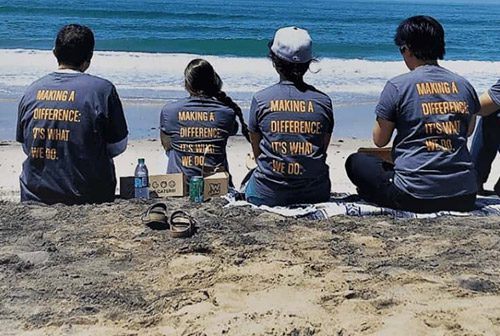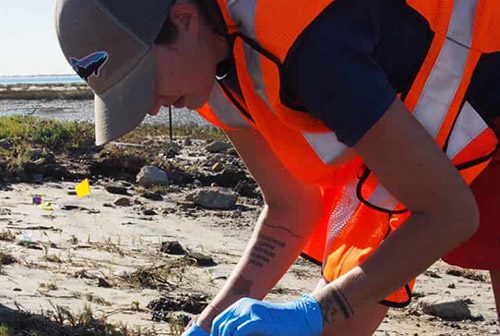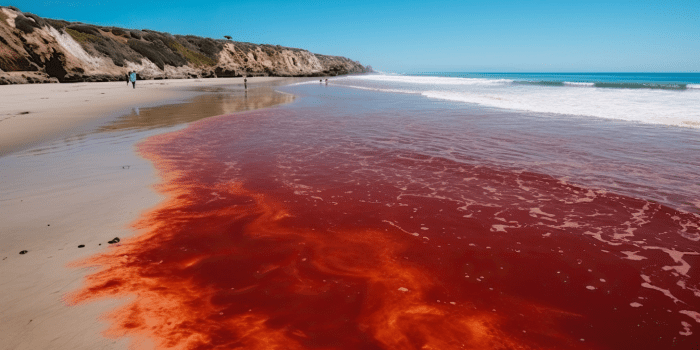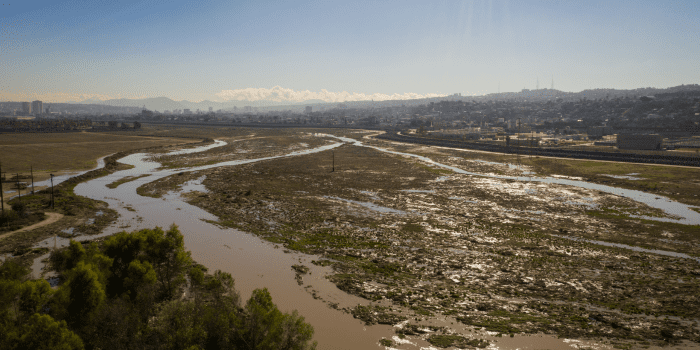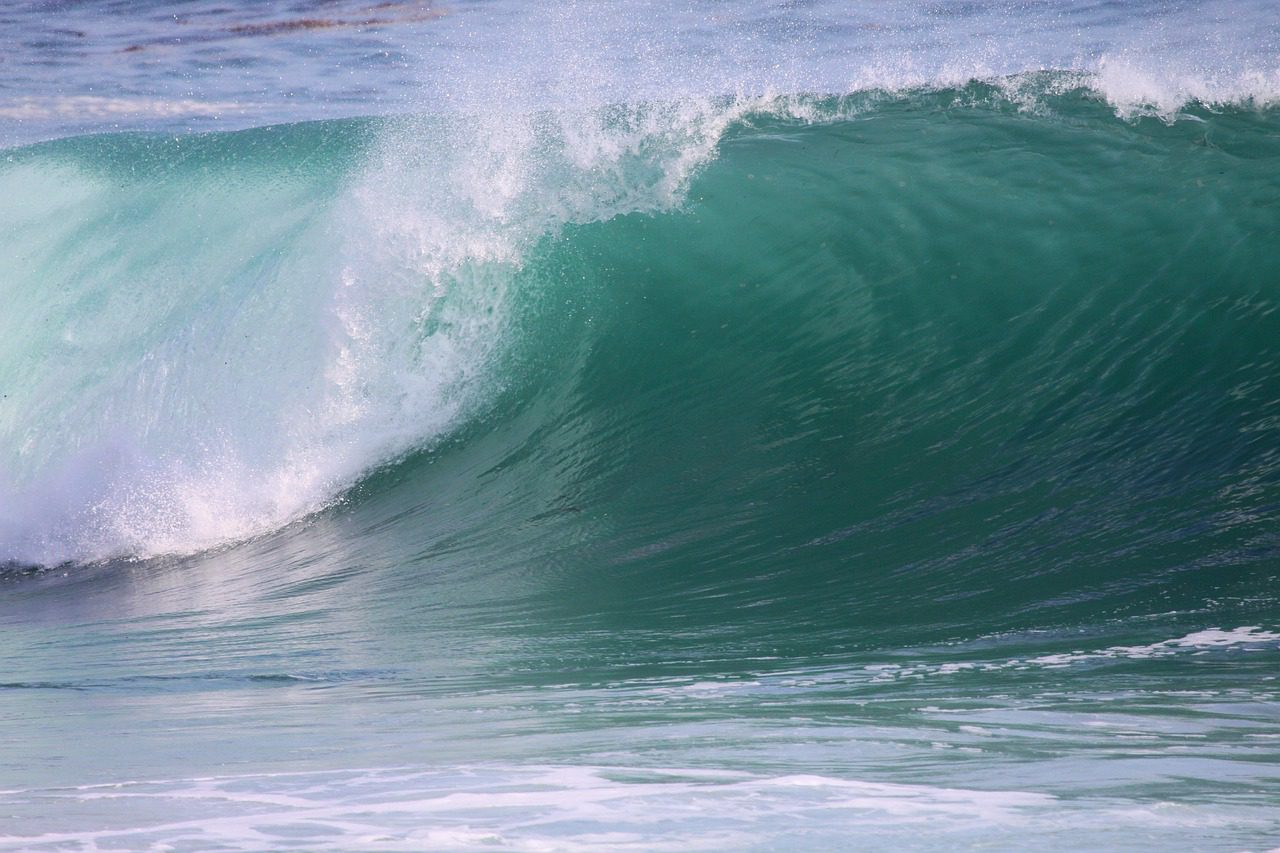Call to Action: Oppose destructive industrial fish farming off San Diego’s coast
San Diego Coastkeeper and our allies urgently need your help speaking out against a massive pollution-spewing industrial fish farm currently proposed for federal waters off San Diego’s coast. The project, called Pacific Ocean AquaFarms, would turn San Diego into a testing ground for environmentally reckless, under-regulated industrial aquaculture that will degrade the marine environment and threaten local fisheries. You have two important opportunities to stand up for marine life and protect San Diego’s ocean from industrialization. Please add your voice and help us reject putting private profits over the health of our ocean and the livelihoods our local fishing community.
- Submit a public comment to NOAA before October 26. NOAA, the agency leading the advancement of this project, is currently accepting public comments on environmental analysis. You can submit comments any time prior to October 26 by going to THIS page and clicking the green “Submit a Formal Comment” button in the upper righthand corner. Complete the required fields and enter or attach your comments. You can visit our aquaculture page for more information and talking points.
- Contact Port commissioners to express your opposition by November 10. The Port of San Diego is poised to share in the profits of this project at the expense of our ocean, our environment, and our local fishing community. We need to let the Port know this is unacceptable. Port commissioners will be voting on November 10 on whether to advance the project – before it has even undergone environmental review. We urge you to contact them by email on THIS page and voice your objection before they vote.
The Backstory
In 2015, San Diego Coastkeeper caught wind of plans to construct a giant, pollution-spewing commercial fish farm off San Diego’s coast. The project – then called Rose Canyon Fisheries – proposed to raise commercially valuable yellowtail in the unregulated federal waters due west of Mission Beach. It would be the first ever commercial aquaculture project of its kind in the United States, and lay the foundation for innumerable such projects up and down the coast.
The stakes for this project are enormously high.
San Diego Coastkeeper and other groups unwilling to see the waters off the San Diego coast sacrificed to a floating industrial feedlot pushed back hard, and plans for the 700 acre fish farm were quietly shelved in 2016.
In September 2020, the project resurfaced under the same ownership and a shiny new name. Recent news stories, such as this one in the U-T and this one in the La Jolla Light, lay out the latest efforts to reboot plans. Now called Pacific Ocean AquaFarms, the project is still helmed by a Long Beach based investment firm in partnership with Hubbs-SeaWord Research Institute, whose SeaWorld affiliation seems to betray a compulsive need to find new ways to pack marine life into cages in order to squeeze out a profit.
In both its 2015 and 2020 iterations, proponents of the project claim the massive fish farm will benefit the local economy and provide locally sourced protein to a growing populous. They liberally attach the moniker “sustainable” to the efforts, despite planning to raise protein-hungry yellowtail. Yellowtail are carnivorous fish, and the feed conversion ratio – that is, the pounds of feed fish needed to produce a pound of yellowtail – makes it hard to claim in good faith that its production is anything approaching sustainable.
The reasons for opposing a massive offshore aquaculture project like Pacific Ocean AquaFarms are as plentiful as they are grave.
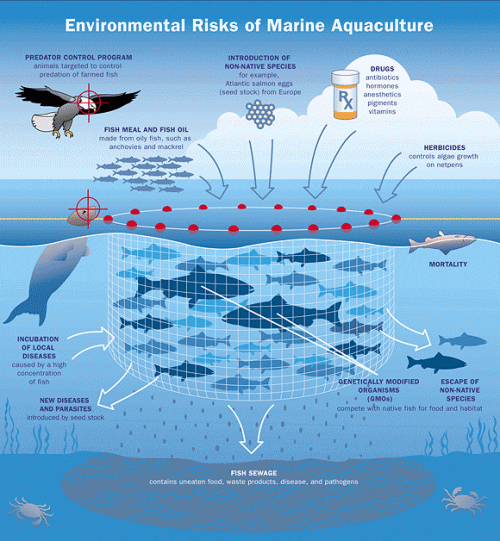

Open-ocean projects like that proposed by Rose Canyon Fisheries/Pacific Ocean AquaFarms, while being lucrative for their owners, have immense destructive potential. Confined fish populations easily spread disease to native fish and marine life, and outcompete local fish when they escape. Fish farms excrete excess fish food, antibiotics, feces, and dead fish into the ocean environment, and subject densely packed inhabitants to pathogens, sea lice, and disease. Open ocean fish farms disrupt the natural behaviors of marine wildlife – attracting predators like sea lions and sea birds only to maim or kill them with predator deterrent methods when they approach, and causing others to go out of their way to avoid the area. Importantly, placing an offshore fish farm close to existing marine protected areas, such as the eleven MPAs that enrich San Diego County’s marine waters, can interfere with the MPAs’ ability to support marine life and bolster local fish stocks.
Not all aquaculture is created equal
Importantly, aquaculture practices with fewer environmental impacts are available. San Diego should follow the State’s lead and choose to implement more sustainable, environmentally responsible efforts which, in turn, will drive local innovation and economic activity while ensuring local environmental resources are protected; claims Pacific Ocean AquaFarms cannot come close to authentically making. Among these less damaging alternatives are on-shore closed-loop system fish aquaculture, and kelp and shellfish farming.
In stark contrast with the approach planned by Pacific Ocean AquaFarms, just last month California’s Ocean Protection Council voted to approve funding for its “Aquaculture Action Plan” for truly sustainable aquaculture. Not by coincidence, this plan specifically excludes offshore finfish production, in large part due to the well-documented environmental impacts offshore industrial aquaculture projects have exhibited worldwide.
What Next?
Critically, your help is needed to oppose Pacific Ocean AquaFarms and projects like it. Far from the sustainable local seafood miracle its PR team would have you think it is, the project actually represents a corporate giveaway of over 700 acres of open ocean just three to four miles off the coast of Mission Beach. San Diegans do not need a floating feedlot raising high-cost sushi fish for the profit of a few and at the expense of our marine and coastal environment. Because there exists no overarching federal regulation of such projects – a loophole the project proponents are all too happy to exploit – the stakes for ending this precedent-setting fish farm could not be higher.
San Diego deserves better than to be treated as a testing ground for destructive, unsustainable marine industrialization. With your voice alongside ours, we stand a much better chance at protecting our coastal resources. Speak up today!

